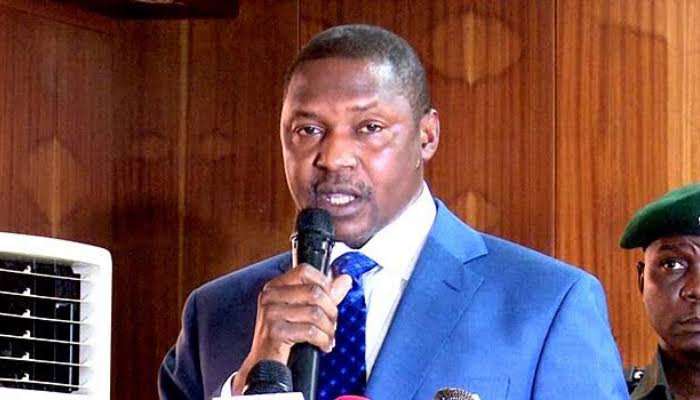The Chief Justice of Nigeria, CJN, Justice Ibrahim Muhammad, on Tuesday, tackled the Attorney-General of the Federation and Minister, Mr. Abubakar Malami, SAN, for saying that the judiciary should be held responsible for delays in the trial and delivery of judgements on corruption cases involving politically exposed individuals.
The CJN, in a statement that was signed by his Senior Special Assistant on Media, Mr. Ahuraka Isah, accused Malami of selling a “one-sided” narrative to Nigerians.
Malami, who was a guest on Channels Television’s program, Politics Today, on Monday, had blamed the judiciary for the perceived delays in the conclusion of high-profile corruption cases.
He however boasted that the President Muhammadu Buhari-led administration, through the Economic and Financial Crimes Commission, EFCC, has secured over 2000 convictions.
Meanwhile, dissatisfied with Malami’s attack on the judiciary, the CJN, accused the Federal Government and its agencies of conducting shoddy investigations before rushing to court to file charges.
“More often than not, the Federal Government’s prosecution sector files more charges than it can prove or provide witnesses to prove, ostensibly at times for the prosecution to even fail”
“The Administration of Criminal Justice Act (2015) under reference is infected with sores in some parts, making speeding adjudications improbable in some instances, in addition to high volume of cases, limited number of judges, poor infrastructure or archaic equipment”, the CJN stated.
He said though the Nigerian judiciary was not out to lay claim to be perfect, “but when the political and economic conditions under which it is operating is compared with its counterparts in other climes, it would be adjudged a prized model.
The judiciary by its constitutional position does not have criminal investigation unit or ‘’Fraud Detective Squad’’ to detect and investigate criminal involvement of any person, neither does it have a garrison command to fight its cause or enforce its orders and decisions”.
More so, the CJN, in the statement, noted that Malami had while giving reasons for the under-funding of the judiciary, said on January 26, 2022, at the Nigerian Bar Association, NBA, Justice Sector Summit 2022 in Abuja, that the judiciary has not been transparent in the spending of budgets allocated to it each fiscal year.
“Although judiciary has refrained from joining issues all this while, but to state the facts, in line with the budget call circular and ceiling the Federal Government sent to the judiciary before the commencement of the fiscal year, the judiciary prepares its budget estimates for capital, overhead cost and personnel cost according to the ceiling, needs and priority”
“The judiciary defends its budget before the senate and the House of Representatives Committees on Judiciary at the National Assembly, besides the initial vetting by the executive”
“The Judiciary has an internal mechanism for budget control and implementation. Each Court and judicial body has a budget unit, the account department, internal audit, Due Process Unit, as well as Departmental Tenders Board”
“There is also a Due Process Committee at the NJC and the Judicial Tenders Board that award contracts on expenditure above the approval limit of the accounting officers of the Courts and judicial bodies”
“These layers of control were established by the Judiciary to ensure transparency, accountability and effective budget implementation. The type of transparency that the Federal Government has stressed”
“Similarly, by virtue of Sections 88 and 89 of the 1999 Constitution, the National Assembly carries out oversight visits to the Judiciary to monitor the implementation of its budget”
“Section 88(2)(b) also mandates the National Assembly to expose corruption, inefficiency or waste in the execution or administration of laws within its legislative competence and in the disbursement or administration of funds appropriated by it”
“The Executive also put in place some mechanism to monitor budget implementation and accountability in the Judiciary through its organs like the office of Accountant General of the Federation and Auditor General of the Federation and other agencies where the need arises”
“Apart from the internal audit units of the Judiciary, the Federal Audit Department maintains offices in all the courts and judicial bodies that monitor spending in the Judiciary”
“If the Federal Audit raises a query on any transaction and it is not well defended, it sends such to the Public Account Committees of the National Assembly. Officials of the Judiciary would be invited to explain themselves”
“The question to ask is who else should the Judiciary open its account books to, and who among these organs had raised exceptions which were not defended by the Third Arm? The answer is none”
“One only hopes that these allegations against the judiciary by the Federal Government is not just a way of giving a dog a bad name so as to then hang it”, the statement further read.
